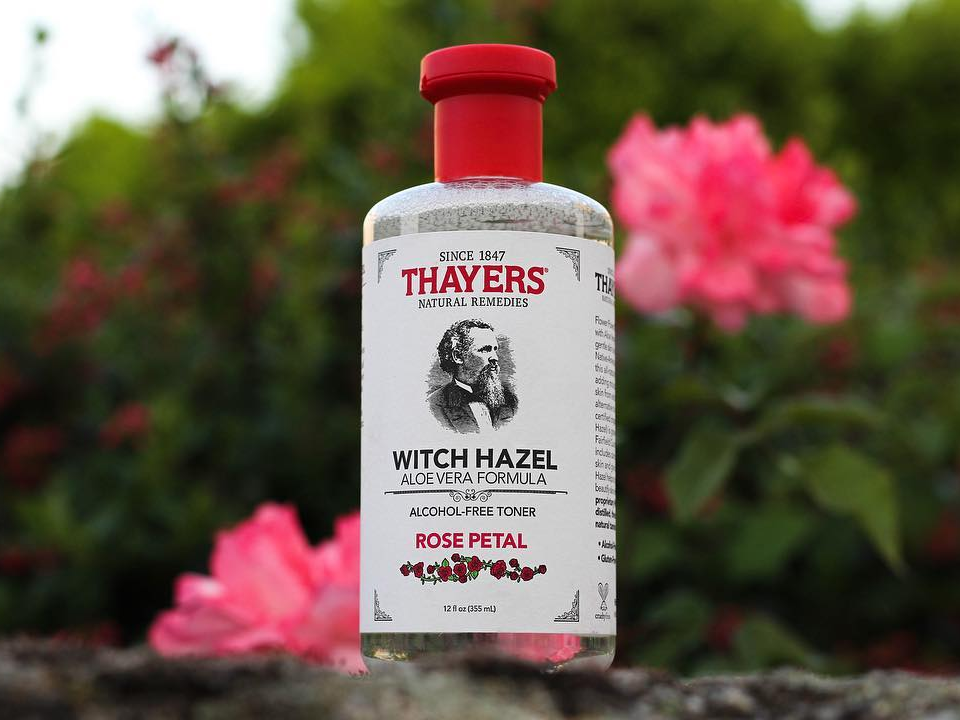- Thayers Rose Petal Witch Hazel Toner has taken the internet by storm – racking up more than 3,900 five-star reviews on Amazon, with many users calling it their “Holy Grail” product.
- Why do people like it? It’s non-drying, gentle but effective, and free from harmful ingredients like parabens and propylene glycol. Plus, it’s under $10.
- I tried the cult-favorite toner and can see why people love it so much – it’s gentle and doesn’t leave my skin feeling tight or stripped.
- Right now it’s cheapest at Amazon ($10.95), but you can also find it at Target, Thrive Market, and Ulta.
In general, “good” skincare and beauty products aren’t affordable. The rule – whether earned or simply given – is that expensive products are better than less expensive ones. The exception to this, of course, is the handful of outstanding drugstore products that gain notoriety via word-of-mouth and then, seemingly overnight, snowball into a phenomenon.
The $10 Aztec Clay Mask – with nearly 16,000 reviews on Amazon – is one such product.
Thayers Rose Petal Witch Hazel Toner is another. Despite beginning as just another under-$10 product stocked alongside paper clips and floss at retailers like Target and Amazon - the toner has racked up more than 3,900 five-star reviews on Amazon alone, been recommended by Allure, and been called a "Holy Grail" product by users and celebrity makeup artists alike - including Jo Baker, makeup artist to Emmy Rossum, Salma Hayek, and Olivia Wilde. Right now, a different variation of the toner currently takes all three of the top spots on Amazon's most popular toners. In all of Amazon's skincare offerings, it cracks the top five most popular under $25.
What is it?
Thayers' Rose Petal Witch Hazel Toner is an alcohol-free toner made from witch hazel, aloe vera, and rosewater. Witch hazel, a botanical extract derived from a flowering plant that humans have used medicinally for ages, is known to be soothing, anti-inflammatory, and have antioxidant properties. More colloquially, people often use it to combat acne since it removes excess oil from the skin. That means that, if overused, witch hazel can be drying - a property that's only exacerbated by the fact that most toners that contain it also tend to include alcohol.
In contrast, Thayers' Rose Petal Witch Hazel Toner pairs the clarifying properties of witch hazel with rosewater and aloe vera to hydrate the skin. According to Thayers, the formula's rose petals work twofold: their natural oils and sugars ramp up the skin's dewiness, while its vitamin C aids collagen production, strengthens the skin, and fades blemishes and scars. Certified organic aloe vera helps pump moisture back into the skin. Altogether, it's free of alcohol, parabens, and propylene glycol (a potentially irritating synthetic).
Used after cleansing but before moisturizing, the toner will remove excess dirt, oil, makeup, and any residue left over, prep the skin to absorb the rest of the products in your regime (like moisturizers), and both clean and minimize pores.
What it's like to use
Until I tried the 10-Step Korean Skincare Routine (and the popular Acwell iteration), my experience with toner was isolated to my early teens. Caught in the first wave of serious acne, I had allied myself with a militaristic understanding of skincare: the more it stung, the more bacteria it must be killing, and the better it must be working. Under that logic, harsh alcoholic astringents became foundational pillars. Spoiler: they did not fix the issues.
Today, you'd probably have to pay me to slather anything that harsh on my skin again. Dermatologists typically agree that most alcohols only serve to dry out the skin, and a more sustainable approach may be feeding healthy bacteria rather than obliterating as many of them as possible indiscriminately. That way, they can self-manage a healthy microbiome on top of your skin - kind of like an immune system - rather than face the world and its pollutants every day anew.
All this meant I was skeptical of an under-$10 toner that claimed to be gentle and effective - even one that was free of alcohol. However, post-personal use, I get the enthusiastic fandom: for me, the Thayers' Rose Petal Witch Hazel Toner was indeed gentle, relatively non-drying, and did the job of helping clean off the vestiges of earlier cleansers so the rest of my skincare routine could sink in more effectively. My pores also looked noticeably smaller, and I've started using it as an effective spot-treatment to isolate and treat blemishes as they pop up. If you're looking for a toner, it's a solid option - and it's a big bonus that it's less than $10 for a 12-ounce bottle.
How to use it
To use it, wash your face, pat it dry, and soak either a cotton ball or cleansing pad with the toner. Lightly spread it across your face and neck. If you're following with essence or moisturizer, let the toner dry before applying other products on top of it. You may want to transition first with once-daily or every-other-day applications, but, typically, toners are fine to use twice daily - depending on how your skin reacts.
My only notes are that, while the fragrance is pleasant and natural, I typically prefer unscented skincare. Fragrance at best is an unnecessary additive and at worst can hide harmful ingredients under a loosely vetted definition. If you're like-minded, try Thayers' Unscented version - it's the same price and also has witch hazel and aloe vera.
And since it's always wise to test new skincare products on smaller and/or less visible patches of the body before dousing your face, you may want to dab toner on your wrist to test your body's reaction first.
